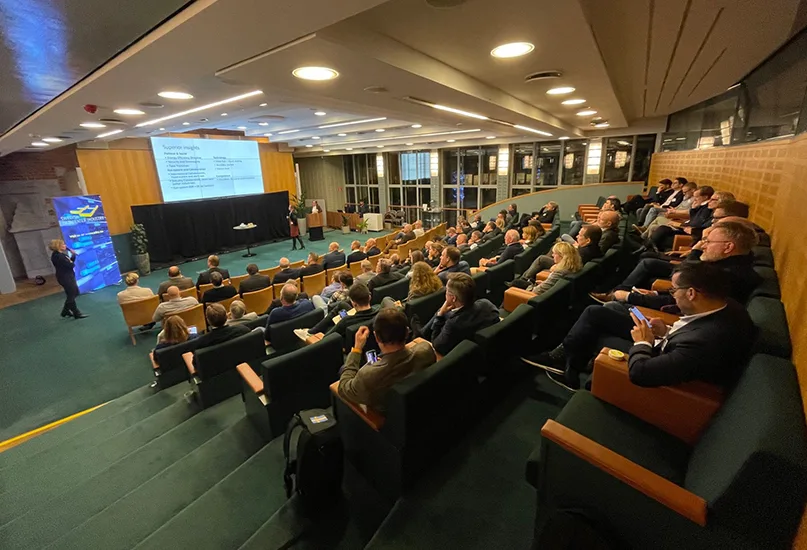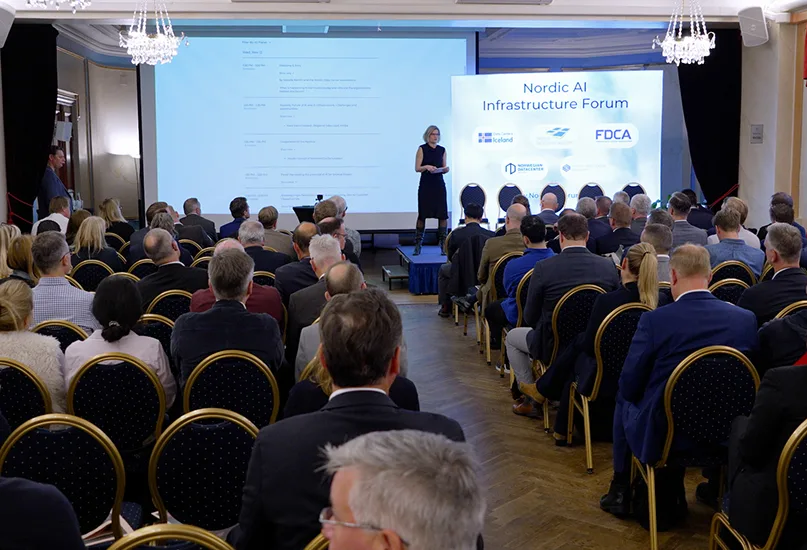With data centres having an increasingly critical impact on daily lives and economies, it is more important than ever to ensure a stabilised and resilient data storage system that can meet modern demands. We look at Sweden’s data centre industry and how it’s leading the way to a digital future.
SPOTLIGHT ON SWEDISH DATA CENTRES
It is undeniable that data centres have come to play a critical role in modern civilisation. No matter where an individual may find themselves – at work, in school, or even relaxing at home – interaction with data centres and services is a daily occurrence.
These digital services and information, which are relied upon globally, are resulting in the increased demand for digitalisation and artificial intelligence (AI) services, thus amplifying investment into data centres.
Currently, due to this rapidly increasing demand, the Nordic region and the countries it comprises are quickly emerging as a hub for data storage infrastructure.
Across the Nordics, data centres benefit from unique selling points, most prominently the constant supply of green electricity, a cold climate that reduces the need for expensive cooling equipment, and a stable geopolitical landscape. These reasons are driving more and more hyperscale operators to Northern Europe.
Specifically, Sweden stands as the largest data centre market in the region and the only one with over one gigawatt (GW) in total IT capacity. Additionally, total supply has grown at a five-year compound annual growth rate (CAGR) of 13.7 percent from 2018 to 2023.
The country is a global leader in renewable energies thanks to a combination of hydropower, nuclear energy, wind turbines, and biofuels. These accomplishments have led to Sweden being top of the Global Sustainable Competitiveness Index annually since 2016.
Data centres with high sustainability credentials are significantly more attractive to investors and those looking to construct new infrastructure, as the environmental impact of data storage is becoming an increasingly important topic of discussion within the industry.
Equally, Sweden’s digital economy is second in the EU for ease of doing business, third for political stability – behind only Luxembourg and Malta – and has the highest proportion of ICT specialists.
Even more formidable, the country is the only one in the Nordic market where the three major cloud hyperscalers – Amazon Web Services, Google, and Microsoft – have already built their own facilities or are working towards constructing their own.
Traditionally, storing data in the Nordic region has been scrutinised because of its long distance from pre-established data operations. However, improvements over the last decade in international connection speeds have made the area an attractive and viable location for data storage.
As technologies continue to emerge, the roll-out of data centres in Sweden is poised to continue accelerating at a rapid rate, drawing in more and more clients and investors as they recognise the vast potential and advantages the country offers.

Q&A WITH THE SWEDISH DATA CENTER INDUSTRY ASSOCIATION
Supporting the Swedish data centre industry and creating added value of economic and intellectual art for members, the Swedish Data Center Industry Association is influencing the sector and creating a stronger, more sustainable future. Ann Wingård, Managing Director, tells us more.
Firstly, please explain the origins of the Swedish Data Center Industry Association – when was it founded, and what was your initial vision?
Ann Wingård, Managing Director (AW): The Swedish Data Center Industry Association (SweDCI) was founded in 2019.
The initial vision was to form a community for actors in the data centre industry to be able to influence and affect matters that are of importance for the sector as a whole to drive growth, promote Sweden’s advantages as a place to locate a data centre, and build a network for stakeholders.
EO: What is your current take on the data centre industry across Sweden? Is it a particularly exciting or challenging environment to work in?
AW: The industry is very exciting as there are a number of organisations wanting to place their data loads in Sweden and many players who want to build facilities in the country.
There are plenty of advantages to having your data centre in Sweden – a very green electricity mix, high technology competence, a stable political landscape, and a naturally cool climate.
But, of course, there are challenges as well – inconsistent rules and regulations, rigid and time-consuming processes for permits, unevenly distributed access to power over the country, and a lack of certain competencies such as cooling engineers.
How does SweDCI market the industry and members of the association both nationally and internationally?
AW: Over the years, we have been growing into the position we are at now, where we are the go-to organisation for interviews and general knowledge about the data centre industry and the government and regulatory authorities seeking our input on new directives and regulations.
Working in a focused way, being where the decisions are made, and contributing with our collective knowledge has taken us to where and what we are today.
We are hosting and co-hosting data centre events in Sweden, in which we have a stand where our members can be visible. We also participate in large events across Europe, such as the Datacloud Global Congress in Cannes, France, where we are hosting a Nordic pavilion with our sister associations in the region.
Additionally, we have a seat on the board of the European Data Centre Association (EUDCA), write and co-write articles, have speaker slots, panels, and podcasts, and are working to increase our international visibility.
How does SweDCI’s strategic geographical position provide a distinct advantage?
AW: SweDCI is very clear about putting Sweden first – just as our name indicates – but we also work very closely with our sister organisations in the Nordic region, i.e., Denmark, Norway, Finland, and Iceland. Together, we cover and represent one of the most attractive areas for locating a data centre, even if the respective countries are fairly small.
Sweden and Stockholm in particular are the largest markets in the Nordics, so we have naturally taken the lead for several initiatives over the years.

Can you expand upon SweDCI’s new communication platform – SweDCI Connect (Spintr) – and how this will help to enhance collaboration and information sharing for members?
AW: Like many organisations, sharing information is a challenge that should never be underestimated! We realised that sharing information, and thereby collaboration and networking amongst our members, would be beneficial as an internal tool for easy communication.
It’s hard enough to keep track of communication and information in one company, and within SweDCI, we need to provide this to our members in an easy-to-digest manner so they can handle information in a way that is as easy as how they handle it in their respective organisations.
SweDCI Connect (Spintr) is already helping us to stay in contact and share information after just a couple of months. The plan is to invest further time into the platform for continuous improvement since we are determined that this brings value to our members!
Additionally, please tell us more about SweDCI’s objective to support the business interests of members and how these objectives manifest in your day-to-day operations.
AW: Our vision is to lead the development of data centre excellence, and our mission is to foster a robust and sustainable digital transformation in society whilst being a powerful voice towards decision-makers. This is alongside creating a favourable business climate, promoting industry best practices, and facilitating networking amongst member companies.
The initiatives we are driving include enhancing the data centre industry’s growth, articulating and advocating for the needs of the industry, and building an innovative Swedish ecosystem within the ICT sector.
Everything we do and every action and project we spend time on supports our vision, mission, and initiatives! For example, we promote Sweden as a data centre market and are visible in international fairs and events; we are invited to discussions to help set the thresholds and key performance indicators (KPIs) when directives and regulations are developed before they are implemented; and we connect our members in various meetings, workshops, and work groups to build a strong network and ecosystem.

Are you optimistic about the future of the data centre industry throughout Sweden?
AW: Yes, we are! We’ve only seen the beginning of what can be achieved in Sweden’s data centre industry. Global developments in recent years have made it clear that we must become more self-reliant and cannot depend solely on others. As a result, more companies will seek to keep control of their data within local markets.
At the same time, the rapid growth of AI is driving an unprecedented demand for secure, scalable, and energy-efficient infrastructure. Since AI depends on massive amounts of data being processed and stored, where and how that happens truly matters.
Sweden and the Nordics, with access to clean energy, a stable climate, and high digital competence, are uniquely positioned to meet this demand in a sustainable way.
Finally, what are SweDCI’s goals and priorities, and what strategies will you employ to facilitate and implement them?
AW: We plan to continue to work towards our mission, vision, and initiatives. Our focus areas include data centre industry growth, international visibility, stakeholder engagement, ecosystem expansion, and education and skills supply.




































